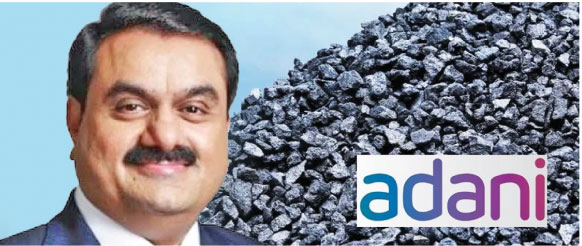Adani now seeks 30pc hike in coal prices
Special Correspondent: India’s Adani Group is strategically profiting from its electricity sales in Bangladesh, despite receiving duty and tax exemptions in India. The company is charging high capacity fees and is now pushing to price low-grade coal at the rate of high-grade coal. Adani Power is demanding at least a 30% increase in coal prices above international market rates.
Sources reveal that the Power Development Board (PDB) first raised concerns about coal pricing in December 2021, months before Adani’s Godda Power Plant in Jharkhand began supplying power to Bangladesh. Initially, Adani demanded nearly double the market price for coal, but when PDB objected, the company agreed to a slight reduction. The new rate was set just 0.01 cents below the highest price paid for coal by Bangladesh’s Payra, Rampal, and Matarbari power plants.
Adani Group offered to maintain this price for a year. However, after that period ended, PDB requested a review of the coal pricing, but Adani has not responded positively. Several meetings between PDB and Adani Group have been held to negotiate coal prices, with the most recent one taking place on Sunday.
During the meeting, Adani representatives stated that coal with a heating capacity of 6,300 kilocalories was priced at $127.72 per ton. Under the terms of the contract, coal with a heating capacity of 4,600 kilocalories should cost $93.25 per ton. However, PDB argued that coal of the same quality is priced at $72.24 per ton on the Indonesia Coal Index. This means that Adani is demanding roughly 30% more per ton of coal.
In an interview with the media, Muhammad FauzulKabir Khan, an adviser to the Ministry of Power, Energy, and Mineral Resources, stated that he was unaware of Adani’s request for higher coal prices. He noted that although coal prices had been reduced last year, there was an indication that the decision would be extended. Therefore, even if coal prices increase now, Adani may not be able to capitalize on it.
Meanwhile, several PDB officials present at the meeting, speaking on condition of anonymity, said that two months ago, PDB sent a letter to Adani requesting a reduction in coal prices, but the response was not favorable. The officials used an analogy, comparing coal pricing to hilsa fish: “If one kilogram of hilsa costs Tk 1,800, the price of 600 grams should not be the same. It should be around Tk 800 to 900. But if calculated proportionally, the price would be Tk 1,800. Adani is applying this formula for coal pricing.”
Sources also mentioned that the Payra power plant currently imports coal at the lowest cost in the country, benefiting from direct purchases from the international market. In contrast, Rampal buys coal through a third-party contractor, Bashundhara, which raises prices. Adani, however, is benchmarking its prices against Rampal’s higher rates. As a result, PDB argues that Adani’s coal pricing should be considered separately from Rampal’s.
Additionally, the Godda Power Plant was designated as a Special Economic Zone (SEZ) by the Indian government in 2019. This status grants Adani duty and tax exemptions, which reduce capacity charges and coal import costs. Clause 13.1(e) of the agreement stipulates that Adani Power must notify the Bangladesh Power Development Board (PDB) within 30 days of any changes in assumptions, such as tax or VAT rates.
The Power Purchase Agreement (PPA) signed with Adani outlines capacity charges in Clause 13.2(c). The capacity charge rates are detailed in Table-A of Schedule-6 at the end of the PPA. Clause 13.1(d) specifies that capacity charges are based on several assumptions, including tax and duty rates, which are subject to Indian tax policy.
According to Indian media, Adani Power enjoys duty-free benefits on the import of machinery due to the SEZ status. The company imported equipment for the power plant from eight countries, including China, the Netherlands, Belgium, Germany, Sweden, the United States, Italy, and Greece. By February 2022, Adani had imported 95.58% of the power plant’s equipment from China.
Furthermore, Adani has received duty and tax exemptions on coal imports for the power plant. The company is exempt from paying Goods and Services Tax (GST), surcharges, or any other duties on coal imports. If the power plant operates at full capacity, it will require 7 to 9 million metric tons of coal annually, resulting in Adani receiving $200 million in duty-tax exemptions on coal alone.
In addition, Indian state governments impose a carbon tax of 400 rupees (or $4.88) per ton of coal for carbon emissions. Adani is also exempt from this tax, which amounts to an annual savings of around $39.02 million if the plant consumes 8 million metric tons of coal. Over 25 years, this exemption could total $1 billion.
Indian media also reported that Adani’s Godda Power Plant will benefit from 100% duty-free status for the first five years as part of the SEZ agreement, followed by a 50% duty exemption for the next five years.
Under the agreement, Adani would typically be required to pay a range of taxes and duties, including a 12.5% customs duty and excise duty on power plant equipment, a 15% service tax on construction work, a 2% central sales tax on goods purchased outside Jharkhand, and various other taxes. However, all these duties have been waived. Despite these exemptions, Adani is not offering any concessions to Bangladesh on electricity prices.
PDB is obligated to pay a capacity charge of $39.43 million per month to Adani, regardless of whether electricity is purchased. This amounts to an annual capacity charge of $473.16 million, and over 25 years, this charge will total approximately $11.83 billion.
Rare Israeli airstrike in Beirut kills Hezbollah commander and more than a dozen others
International Desk: Israel launched a rare airstrike that killed a senior Hezbollah milita…








